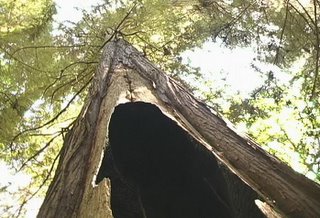 This Cedar is a Culturally Modified Tree that lives on hundreds of years after it was bark stripped for weaving and later burnt for a canoe that was never felled.
This Cedar is a Culturally Modified Tree that lives on hundreds of years after it was bark stripped for weaving and later burnt for a canoe that was never felled.The remarkably beautiful beaches of Oceanside have been home to people for thousands of years. Based on archeological evidence an estimated 10,000 First Nation’s people lived in the area now named Oceanside, along the east coast of Vancouver Island from Craig Bay to the Little Qualicum River, prior to contact with Russian, Spanish, and English fur traders. Many thousands more people lived to the north and south on the shores of the Strait of Georgia. By 1849, when the Crown Colony of Vancouver Island was created, most of these people had died from the ravages of European diseases.
Midden and other and other remains indicate that this coast was once alive with a civilization that respected the natural environment that surrounded them. They honoured the fact that the existence of human beings depends upon the well being of the natural world that provides all of the abundance that sustains humanity. Communities moved to different locations in conjunction with the seasons and lived in accordance with the laws of nature. What is truly amazing is how few remains of that civilization are left today, a testament to the low impact first nations had upon the planet.
Today that same coastline is broken by concrete and stone breakwaters while high-rise condominium developments, board walks, and boat basins are planned for the near future. How long will it be before a casino is built on the waterfront?
In May 2000 the Nisga'a became the first group of aboriginal people in British Columbia to sign a treaty with the provincial and federal governments. All other First Nations in BC have yet to negotiate and sign a treaty since they were never conquered, nor have they ever ceded their land to the British, the province or the federal government. "Just because they've come here and done a lot of damage, it doesn't mean they own it," said Guujaaw, president of the Haida Nation. "We don't have any place to go, this is our planet here."
On November 18, 2004 the Supreme Court of Canada ruled 7-0 that the Government of British Columbia has a moral and legal duty to negotiate with aboriginal groups before permitting logging, mining or other disruptive activities to take place on disputed land. Haida Nation had won their challenge against the American logging giant Weyerhaeuser and responsibility was put squarely on the shoulder of the BC Government to negotiate meaningfully with Haida prior to allowing logging. The BC government ignored this federal court ruling and continued to allow Weyerhaeuser to log at an accelerated rate on Haida Gwaii(Queen Charlotte Islands.)
Haida claim that Weyerhaeuser has violated five of the six provisions they agreed to in a 2002 accord signed by the company, the Haida, and forestry workers. "Weyerhaeuser was going in and grabbing whatever they could on their way out the door," said Guujaaw, president of the Council of the Haida Nation. "We had a contract with them and they broke it."
On March 20, 2005 Haida said; ”Enough is enough” and blockaded all logging roads and log sorts on Haida Gwaii. Forestry workers showed their solidarity with first nations by refusing to cross these blockades. A week later Haida Nation seized several massive barges full of logs worth approximately $50 million from Weyerhaeuser and are now holding them. "We hope we can use this money to get hospitals here ... all our schools are in debt because they've been funded like everywhere else in the province," said Guujaaw, "We will support language and youth programs and help out recreational programs. After all the years and billions of dollars there's been nothing left by that company.”
This action, named Islands Spirit Rising, hopes to make the changes that are critical to a future that respects the land and the people who live on it. Learn more at: www.haidanation.ca/islands/islands.html
In Port Alberni Hupacasath First Nation Chief Judith Sayers said; “The recent Supreme Court of Canada decision in the Haida case was very clear that consultation must occur where lands could be denuded or damaged.”
Locally and around the province First Nations continue to be ignored by the BC Liberal government, crown land is being sold without their consultation, resources are being extracted before treaties are signed, and rights are being disregarded.